'He fulfilled his farz to his country,' a grieving mother says of Major Mustafa Bohara who was awarded the Shaurya Chakra, the nation's third-highest medal for gallantry in peacetime.

When Mrs Fatema Bohara travelled from Rashtrapati Bhavan in Delhi to her home in Udaipur, it was the most difficult journey of her life.
Sitting in the plane, she kept thinking that this was the same route her only son had taken on his final journey home, his coffin draped in the national flag.
She felt she would die with grief. In her lap, she carried the Shaurya Chakra, India's third highest gallantry medal for bravery that was presented to her by the President of India at Rashtrapati Bhavan the previous day.
On reaching Udaipur, she did not go home, but to the cemetery where her son, Major Mustafa Bohara, 27, was buried last October in a military funeral.
"I placed the medal on his grave and told him you could not wear it on your chest and placed it in your mother's hands -- but it is yours," says Mrs Bohara, her voice quivering with pain and stifled by tears as she spoke over the telephone from Udaipur.
On reaching home, she placed the gallantry medal beside his framed photograph.

As Mrs Bohara spoke, her voice was overwhelmed with love, pride, grief, admiration, loss and tears. There were moments, she spoke clearly and then there were times when she broke down.
"I don't want to show my tears because mothers should not cry for their soldier sons who sacrifice their lives for the nation. But I am a mother after all. I remember every moment spent with him. Yet, I get strength from Mustafa's last moment," she says as tears inundate her again.
"I often wonder would Mustafa not have known that these were the last moments of his life? Would he not have thought whether he should save his life or the lives of others?"
"I feel that in that last decision, he thought of others and not of himself -- and similarly, it is my duty to think of others rather than myself."
"I should be brave and not complain that my son will never return to me. He is always with me. He is upholding me in my weakest moments. His love surrounds me everyday," she says fighting back tears unsuccessfully.

Major Mustafa Bohara, an army aviation pilot, was killed along with Major Vikas Bhambu and three crew members after completing a flying mission on October 21, 2023 near the China border in the dense hills of Arunachal Pradesh.
The helicopter caught fire and started losing height in the difficult terrain. Both the pilots were experienced aviators with more than 600 hours flying experience on the helicopter and 1,800 service flying hours between them, according to Honourpoint, an online memorial to Indian soldiers.
They could have landed the chopper right away which would have saved their lives, but that would have caused loss of civilian life on the ground.
The pilots turned the chopper towards the jungle and crash-landed away from habitation. All five soldiers died in the crash.
"The soldiers saved the lives of others by sacrificing theirs," says Mrs Bohara.

Three days before the unfortunate mishap, Mrs Bohara had sensed the unimaginable. Her mind was blank, tears kept rolling down her cheek and she could not bring herself to eat.
She missed her son acutely. For most of her life, she had lived with her son and daughter while her husband worked in Kuwait. After Major Mustafa left for the National Defence Academy aged 17, she had her daughter for company, but made it a point to visit her son every 2-3 months.
She travelled to Pune, Dehradun, Nashik, Pathankot, Allahabad -- in the 11 years he served the Indian Army, she had visited him wherever he was stationed.
The only place, she had not been was Arunachal Pradesh. He had left home for his posting in the north east by car on August 1, travelling nearly 3,500 kms over 4-5 days.
Mrs Bohara wanted to travel the long route with him, but he dissuaded her for undertaking such a tough journey.
It had nearly been three months since he left home and the long absence for her seemed like fighting a war of her own.
"He used to make a video call every night. He spoke to us the night before like he did every night. My daughter told him that 'Mama is not eating and crying all the time. You take her with you'," says Mrs Bohara.
"When he asked, 'Mama, have you eaten?' I said I had juice and he said that was not enough."
"I noticed the glow on his face, there was an aura. I thought kahi meri nazar na lag jaye. I could not understand why I felt that way."
"I did not know what terrible news the next morning would bring."

In the months after his passing, Major Bohara's father, Mr Zakiuddin Bohara, left his job in Kuwait and returned to India.
Their daughter who finished her dental internship recently moved with her husband to Dubai.
His fiance who Mrs Bohara still refers to as 'bahu' has married.
At the solemn ceremony at Rashtrapti Bhavan, Mr and Mrs Bohara accepted the medal while their daughter and son-in-law sat among the guests.
"The live telecast made it possible for the nation to unite in that moment. I was seeing my whole Hindustan and felt what the country would have felt," says Mrs Bohara.

The defence investiture ceremony is the most solemn occasion to honour India's greatest heroes. In attendance are the bravest of the brave gallantry awardees and the next of kin of heroes who laid down their lives for the country.
"There was a constellation of stars in the hall that day. The story being told was not of my son alone, but that of many brave sons. The story of every mother was the same," says Mrs Bohara.
Later in the evening, Mr and Mrs Bohara were invited along with other gallantry awardees to the chief of army staff's residence.
When General Upendra Dwivedi, the chief of the army staff, met them, she told him that she had given birth to her son and brought him up, but his second upbringing was in the NDA and the fauj.
"I told him, 'Sir, the biggest lesson you taught him was that 'desh se bada kuch bhi nahi hai [the country is supreme] and when it comes to the country, you have to give your life for it. He was true to his duty and I salute my son for that'."
Just as she raised her hand in a salute, the army chief saluted her, saying, "I want to salute the mother who gave birth to such a hero."
Then the two saluted each other. It was the most poignant moment of the evening.
Feature Presentation: Aslam Hunani/Rediff.com


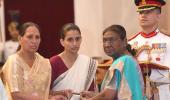
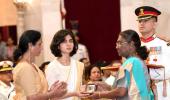




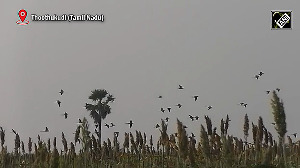
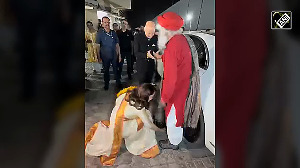
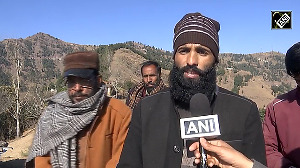
 © 2025
© 2025